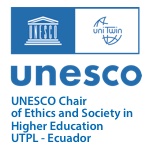A STS Approach to Critical Digital Literacy
Abstract
n response to the I Contemporary Thought Symposium to be held at Universidad Particular de Loja, with its main topic being «New Technologies in Education», I take inspiration from scholarly accounts in Media Studies and Science and Technology Studies to suggest a conceptual approach to critical digital literacy in educational settings.
Downloads
References
Bijker, Wiebe (2010). «How is Technology Made? That is the question!». Cambridge Journal of Economics 34 (1): pp. 63–76. doi: 10.1093/cje/bep068.
Brown, Nik (2003). «Hope Against Hype: Accountability in Biopasts, Presents and Futures». Social Studies of Science 16 (2): pp. 3–21.
Buckingham, David (2015). «Defining digital literacy: What do young people need to know about digital media?» Nordic Journal of Digital Literacy 1 (4): pp. 21–34.
Couldry, Nick (2017). «The Myth of Big Data». In: The Datafied Society: Studying Culture through Data, edited by Mirko Schäfer and Karin van Es. Amsterdam: Amsterdam University Press, 2017, pp. 235–239. doi: 10.5117/9789462981362.
Felt, Ulrike, Rayvon Fouché, Clark Miller, and Laurel Smith–Doer (2017). «Introduction to the Fourth Edition of the Handbook of Science and Technology Studies». In: The Handbook of Science and Technology Studies, edited by Ulrike Felt, Rayvon Fouché, Clark Miller, and Laurel Smith–Doer. 4th ed. Cambridge: The MIT Press, 2017, pp. 1–26.
Franklin, Seb (2015). Control: Digitality as Cultural Logic. Cambridge: The MIT Press.
Freebody, Peter, and Allan Luke (1990). «Literacies programs: Debates and demands in cultural context». Prospect: Australian Journal of TESOL 5 (3): pp. 7–16.
Galloway, Alexander (2004). Protocol: How Control Exists after Decentralization. Cambridge: The MIT Press.
Gilster, Paul (1997). Digital Literacy. New York: Wiley Computer Pub.
Haraway, Donna (1988). «Situated Knowledges: The Science Question in Feminism and the Privilege of Partial Perspectives». Feminist Studies 14 (3): pp. 575–599. doi: 10.2307/3178066.
Hinrichsen, Juliet, and Antony Coombs (2013). «The five resources of critical digital literacy: A framework for curriculum integration». Research in Learning Technology 21 (1): pp. 1–16. doi: 10.3402/rlt.v21.21334.
Koltay, Tibor (2011). «The media and the literacies: Media literacy, information literacy, digital literacy». Media, Culture & Society 33 (2): pp. 211–221. doi: 10.1177/0163443710393382.
Latour, Bruno (2005). Reassembling the Social: An Introduction to Actor–Network–Theory. New York: Oxford University Press Inc.
Michael, Mike, and Deborah Lupton (2016). «Toward a manifesto for the ‘public understanding of big data’». Public Understanding of Science 25 (1): pp. 104–116. doi: 10.1177/0963662515609005.
Neyland, Daniel (2016). «Bearing Accountable Witness to the Ethical Algorithmic System». Science, Technology, & Human Values 41 (1): pp. 50–76. doi: 10.1177/0162243915598056.
Pangrazio, Luciana (2016). «Reconceptualising critical digital literacy». Discourse: Studies in the Cultural Politics of Education 37 (2): pp. 163–174. doi: 10.1080/01596306.2014.942836.
Puig de la Bellacasa, Maria (2015). «Making time for soil: Technoscientific futurity and the pace of care». Social Studies of Science 45 (5): pp. 691–716. doi: 10.1177/0306312715599851.
Star, Susan Leigh (1999). «The Ethnography of Infrastructure». American Behavioral Scientist 43 (3): pp. 377–391. doi: 10.1177/00027649921955326
van Dijck, José (2012). «Facebook and the engineering of connectivity: A multi–layered approach to social media platforms». Convergence: The International Journal of Research into New Media Technologies 19 (2): pp. 141–155. doi: 10.1177/1354856512457548.
Vertesi, Janet (2016). «Seizing the Digital». Engaging Science, Technology, and Society 2 (1): pp. 180–192. doi: 10.17351/ests2016.75
Copyright (c) 2019 © Analysis

This work is licensed under a Creative Commons Attribution-NonCommercial-NoDerivatives 4.0 International License.








